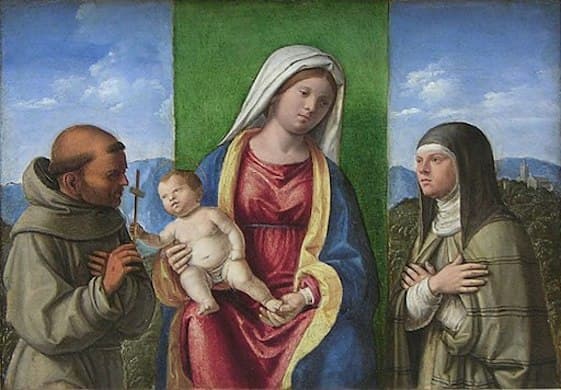Biographies: Two Who Now Go Hand-in-Hand Through History
Kathleen Brady has the dogged devotion a biographer needs to understand her subjects, and to show we cannot truly understand Francis without Clare and vice versa.

‘Francis and Clare: The Struggles of the Saints of Assisi’
By Kathleen Brady
Lodwin Press, 402 pages
The centuries shift our values and our interests, and the lives of saints take on new meanings. So it is with St. Francis, who now cannot go forward in a biography without Lady Clare, who chose to renounce her privileges and a family attempting to force her into an unwanted marriage in order to follow an itinerant merchant’s son, Francis Bernadone.
What did he promise her? A life devoted to God, of course, but also to poverty and mortification of the flesh, reminding everyone — high and low — of the divinity that not only gave them life but expected them to serve a higher purpose than themselves.
Francis ran into trouble with the Catholic hierarchy because he disposed of the middle men, so to speak, the priests and priors and popes (their rank did not matter) in an almost Protestant-like devotion to the word of God, spoken to him —to him — not in the intercessions of the church. Yet Francis never actually rebelled. He spoke his piece but bent his knee to authority.
Now, Clare, that is another matter. She never relinquished her loyalty to Francis’s teachings, which required road work to serve the poor and disadvantaged. She became more Francis-like than Francis, disobeying papal edicts and rebelling against the efforts of the church to sequester her in a cloister.
She battled on for several decades after his death — close to death herself on several occasions, and yet she revived and reached out to the world beyond the heavy doors of her incarceration. There is a great moment in the biography when the cloister doors themselves give way, rotted by time, a palpable rebuke to Rome’s belief that it could seclude Clare into submission.
There is much to admire in Kathleen Brady’s account of Francis and Clare. Ms. Brady has the dogged devotion a biographer needs to understand her subjects, and to show we cannot truly understand Francis without Clare and vice versa. That’s what makes this biography so fresh and revealing, even as it is the product of more than 20 years of deep reading in the scholarship about her subjects.
You might be curious to know how Ms. Brady handles miracles. She neither endorses nor rejects them — not exactly. She is fond of quoting Augustine, who said, in her words, “Miracles were not contrary to nature, only to what we know of nature.” She allows that certain miracles may have natural causes, and leaves it at that.
What cannot be denied, however, is Francis’s powerful attachment to nature, to all manner of creatures, who, it seems, did come to him as to a kindred soul. He remains an inspiring example of the spiritual bond with the environment. In this respect, he was ahead of his contemporaries and of many today, as well.
In “The Art of Biography,” Paul Murray Kendall declared that every biography is an autobiography. Not every biographer makes that plain, but Ms. Brady does in a moving prologue that speaks of her own contention with her Roman Catholic upbringing and the church’s authority. Francis’s and Clare’s strenuous efforts to find the true expression of their faith is given a passionate direction in a biography that may appeal to readers who have undergone the same struggles, or who are drawn to lives that serve this world even though it is in the service of another.
The story of Francis and Clare is surprisingly modern. We learn enough about them in Ms. Brady’s narrative to appreciate their quirks and powerfully independent personalities. Sometimes their story is dramatized, which is not to say that the biographer makes up scenes or events, but from documents and testimony she is able to recreate certain days in the lives of her subjects — even if she sometimes stretches the story a little strenuously in recurring words and phrases such as “surely” and “must have been.” Such is the biographer’s intense desire to bond with her subjects.
Surely — if you’ll pardon the word — that is what makes the biography so appealing. Tell me if you feel otherwise while reading — that you don’t, as I do, feel situated in a world different from ours and yet so recognizable in the tensions of people who want to be themselves even as they realize their obligation to what is more than themselves.

